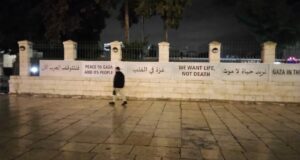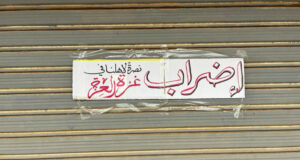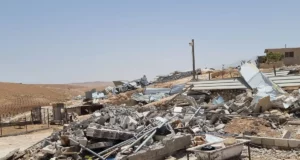17th March 2017 | International Solidarity Movement, al-Khalil team | Hebron, occupied Palestine
Last week we reported on two of the training sessions run by Human Rights Defenders (HRD) here in Hebron for young people to use video as an activist tool against the occupation. Today we wanted to find out more about what the students themselves think and I talked to Yasmin, a pupil at Qurtuba school in the heart of Tel Rumeida. Yasmin looks quiet and shy as she sits next to me on the sofa, but as she talks it is clear she knows what she wants to say and what she wants to do: “I want to show what the Israelis do against my people here, how the soldiers and the settlers humiliate the students and the teachers.”
Qurtuba school sits above Shuhada street and the students have to approach it via a staircase controlled by soldiers, yards from one of the tiniest and most extreme settlements in the heart of H2. Students and teachers are so frequently harassed that fear and anxiety is a constant element of school life. Yasmin told me that only that same day soldiers had entered the school and made sexually harassing remarks to the young women there. Soldiers also regularly block their way to school, although they know perfectly well that the children are students.
Settlers regularly insult, bully and assault children on their way to school and some of this has been already caught on camera. The most notorious settlers are well known to the students who will run to avoid them. A fortnight ago one girl broke her leg trying to get away from the settler Anat Cohen, whose history of assault and harassment of Palestinians and internationals is among the worst.
When internationals like ISM are there, then we report these events: we reported when Yasmin’s friend broke her leg, when soldiers forced Qurtuba children to leave school early so that settlers could celebrate Purim without the presence of their neighbours, or when settlers invaded the kindergarten. But we are not there all the time and Yasmin feels Palestinians should report events themselves: ‘when this happens I can have proof against the soldier – otherwise people will not believe – then they will have trust’.
In the middle of the interview settlers invade the garden of the house we are in. Emad Abu Shamsiya and Badee Dwaik, activists with HRD, come out with their cameras and the settlers scatter: it is a neat illustration of the power of the camera.
And for the future? “I will work to finish my education – Israelis do not like us to have a good education – I will study to become a journalist and expose the occupation. This project has given me extra motivation.” I am sure Yasmin will make a formidable witness both now and in the future.
 International Solidarity Movement Nonviolence. Justice. Freedom.
International Solidarity Movement Nonviolence. Justice. Freedom.


